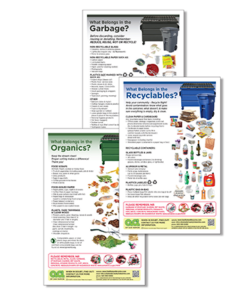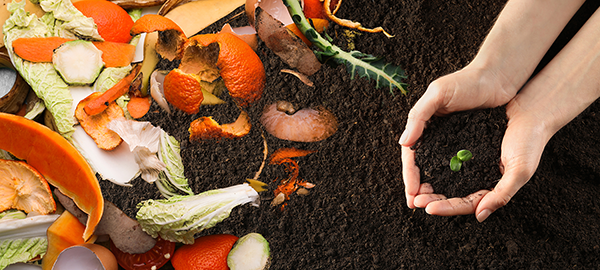
Senate Bill 1383
California’s Short-Lived Climate Pollutant Reduction Strategy Effective January 1, 2022
 For more information regarding Senate Bill 1383, please visit: www.calrecycle.ca.gov/organics/slcp
For more information regarding Senate Bill 1383, please visit: www.calrecycle.ca.gov/organics/slcpIn September 2016, Governor Edmund Brown Jr. set methane emissions reduction targets for California (SB 1383 Lara, Chapter 395, Statutes of 2016) in a statewide effort to reduce emissions of short-lived climate pollutants (SLCP). The targets must:
Reduce organic waste disposal 50% by 2020 and 75% by 2025. Reduce for people to eat at least 20% of currently disposed surplus food by 2025.
California is implementing statewide organic waste recycling and food recovery.
All jurisdictions will need to provide organic waste collection services to all residents and businesses and recycle these organic materials. Some businesses must donate edible food to food recovery organizations with others starting in 2024.
Click here for more information and resources for Alameda County residents and businesses.
Click here for resources in other languages.

Reducing organic waste in landfills = equals less methane. Organics like food scraps, yard trimmings, paper and cardboard make up half of what Californians dump in landfills. Organic waste in landfills emits methane, a climate super pollutant 84 times more potent than carbon dioxide.
Starting in 2022, all residents and businesses in the City of Alameda will need to have organic waste collection services. We are well on our way! The City of Alameda already has Mandatory Recycling Ordinances in place. Click here for more information.
We Are Here to Help!
CONTACT US TODAY! OUR REPRESENTATIVES CAN:
- Visit your business to conduct waste assessments.
- Make service suggestions.
- Help train employees and/or tenants.
- Provide posters, and service guides.
Starting in 2022, food service businesses must donate edible food to food recovery organizations. Food recovery means collecting edible food that would otherwise go to waste and redistributing it to feed people in need. This is the highest and best use for food that would otherwise go to waste. Feeding hungry people through food recovery is the best use for surplus food and a vital way for California to conserve resources and reduce waste thrown in landfills.
Here are links to more food recovery information:
Frequently Asked Questions
Do I have to participate in an Organics Recycling Program?
Yes! All residents and businesses must have an organics recycling and recovery program in place for state regulation compliance. Contact ACI for info on how to start or improve your Organics program today!
OUR REPRESENTATIVES CAN:
- Visit your business/complex to conduct waste assessments.
- Make service suggestions.
- Help train employees and/or tenants.
- Provide poster, flyers, and service guides.
I already have Organics collection in place, am I complaint?
To be compliant, you need to have sufficient service volume and properly sort your waste. We can help! Contact ACI. Click here for info about the ACI Multi-Family collection program. Click here for info about the ACI Commercial collection program.
I don’t create Organic Waste, is there an exemption process?
Yes! A representative must verify your collection service levels and the types and amounts of waste produced. Click here for a form to get started.
What happens if I don’t comply?
Non-compliance will result in penalties and fines. Proper sorting does make a difference. Together we can all help with compliance!
 Proper Sorting Makes a Difference!
Proper Sorting Makes a Difference!
USE YOUR CONTAINERS TO PROPERLY SORT YOUR ORGANIC WASTE FOR:
- Compliance with County Ordinances and State Regulations. Alameda County Mandatory Recycling Ordinance, Alameda County Plant Debris Landfill Ban Ordinance, AB341, AB1826, and SB 1383.
- A reduction in the amount of material going to the landfill which in turn will reduce greenhouse gas emissions. Of the 39 million tons of waste disposed of in California landfills in 2018, one third was compostable organic materials. Anaerobic decomposition of organic materials in landfills produces methane (CH4), a greenhouse gas that contributes to pollution and global warming. Composting organic material sequesters carbon and reduces greenhouse gas emissions.
Prevent Food Waste
Californians throw away nearly 6 million tons of food waste each year. This equals 18% of all the material that goes to landfills.

FIND GENERAL FOOD WASTE PREVENTION TIPS AT:
TIPS FOR FOOD GENERATING COMMERCIAL CUSTOMERS

- Use perishable produce quickly
- Store all food properly. (Typically below 40 degrees Fahrenheit for refrigerators and 0 degrees Fahrenheit for freezers, consult your local health code requirements.)
- Track inventory to prevent over-ordering and spoilage.
- Keep your storage equipment in good working order.
- Prepare for power loss by having a back-up power plan.
GIVE EDIBLE LEFTOVERS TO EMPLOYEES OR DONATE EDIBLE FOOD TO A CHARITY OR FOOD BANK
- San Leandro Community Food Pantry
- Davis Street Food Pantry
- Alameda County Community Food Bank
- www.calrecycle.ca.gov/Organics/Food/Donation/
- For a list of organizations in Alameda County that accept food donations, click here.
- Please contact the organization directly to review guidelines and see if they are accepting food at this time.
SB 1383 will require the donation of edible food for human use. Click here for more information.
Click here to view the information in another language.
Can I get help training my staff and/or tenants on proper sorting?
Yes! We are here to help! CONTACT US TODAY! OUR REPRESENTATIVES CAN:
- Visit your business/complex to conduct waste assessments.
- Make service suggestions.
- Help train employees and/or tenants.
- Provide poster, flyers, and service guides.
